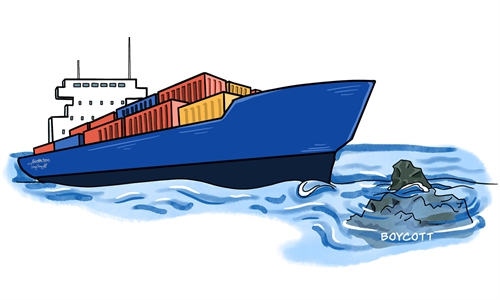COMMENTS / EXPERT ASSESSMENT
‘Cheaper costs than China’ not adequate to lure Tesla to India

Illustration: Tang Tengfei/GT
In New Delhi's latest efforts to bolster India's manufacturing capacity, Nitin Gadkari, the transport minister of the South Asian country reportedly assured Tesla Inc with the cheapest manufacturing cost in world - even lower than China.Coming weeks after Tesla registered a company in India, which sources said would focus on sales rather than production, Gadkari's pitch aroused discussion around the possibility for Tesla to relocate factory from China to India.
While offering incentives to reduce labor cost could enhance Indian factories' competitiveness in global market on some level, for leading new-energy vehicle (NEV) brand Tesla, India is apparently just a fledging market.
To lure Tesla to begin production in India and repeat its success in China, in addition to offer incentives, the South Asian country needs to act fast to foster a large NEV market. Although New Delhi had come up with the 2030 NEV ambition several years ago, the country's NEV market is still in its nascent stage. Without the support of national economic strength and rising income levels of domestic residents, guiding policies couldn't solely push up the sales.
The major reason why Tesla selected to open factory in China was to occupy the largest consumption market and take advantage of the world's top manufacturing hub. India's yearly sales of NEV are far less than the sales in China. Just like the Apple's iPhone couldn't compete with other brands in India for years, Tesla's current move in Indian market is only to test the market and seize advantages at an early stage.
The condition in India is far from adequate to attract Tesla to move its production there. In terms of human resource, to reduce labor cost is only part of the prerequisites. Comparing with China, India is lack of a large number of well-trained and educated workers.
Providing lands to attract foreign brands to open factory, Indian government indeed showed their resolve to boost their manufacturing, but to start production, these factories also require supporting infrastructure including transport system, logistic system and complete facilities for foreign trade.
In addition, the reason why Tesla's Shanghai Giga-factory has achieved such a high production capacity in a short period of time is closely correlated with the local government's administrative efficiency, which the current Indian government clearly doesn't have.
Last but not least, the success of Tesla's factory in China is also supported by the relative complete domestic industrial system and the integration of Asian value chain. Given India's undeveloped industrial chain for NEV, even if Tesla builds its factory in the country now, it needs to import most components from batteries to gearboxes from China, which is against India's aim to reduce economic dependence on China.
While it's understandable India wants to boost local manufacturing of NEV, it's not realistic for India to expect to accomplish this ambition in a single stroke.
In fact, to dock with the Asian industrial and value chain is the only feasible way for India's manufacturing and NEV ambition. But out of geopolitical consideration, India doesn't accept to integrate in the industrial chain developed around China. What New Delhi needs to do the most is to remove the obstacle it added to its own manufacturing development, before it gets too late that its manufacturing has been dragged into a dead end.
The author is secretary-general of the Research Center for China-South Asia Cooperation at Shanghai Institutes for International Studies. bizopinion@globaltimes.com.cn



